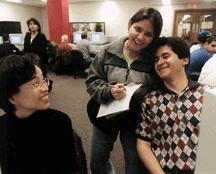Downloading the language
For non-native English speakers, the latest learning lab on campus is helping out in some high-tech ways.
Downloading the language
For non-native English speakers, the latest learning lab on campus is helping out in some high-tech ways.

IEP students (right) — ranging from nearly non-speaking to almost well-spoken — can receive their writing assignments online, as you might expect, or practice taking the Test of English as a Foreign Language (TOEFL), an exam nearly all seek to take at some point.
However, they also can listen to a computer-supplied Billy Joel song while the words appear on the screen or watch the uncut version of Gone with the Wind; while Rhett tells Scarlett he doesn’t give a whit what she does, students can compare the spoken to the actual script. Of course, the lab, situated in an airy space in the library’s basement, is only one component of the versatile 6- to 40-week IEP curriculum. Students also receive writing and reading instruction and are assigned “conversation partners” to practice their verbal skills.
“But the most amazing thing to me,” Gayle contends, “are the students themselves.” He quietly points to the star quarterback from Universidad de las Americas in Puebla, Mexico. Nearby, a pilot from Saudi Arabia. A local au pair from Turkey, sent here by her American employers. Or the woman seated next to Gayle on this February day, 35-year-old Hyun Joo Yee.
English sounds are a flowing stream in my ears, the Korean mother and Christian educator wrote in one of her assignments, explaining what she calls the most difficult thing she’s ever done. Yee and her 5-year-old son Seok Woo Ha live in a small apartment, and he attends Tanglewood Elementary. The two left behind their home (and her husband) in Seoul, Korea, to come to TCU in January.
Yee’s story is not unique, Gayle said. “We have 55 current students from about 20 countries, with very little recruiting and a global economic crisis.” Indeed, the program began with 11 students in 1991; almost 100 students enrolled last year.
“There’s a global teenager out there, who is looking to the West and its ways,” Gayle said. “With that trend, we’re seeing a huge demand for not just English, but American English.”
Gayle said he will be ready: Internet-based courses will be available by summer.

Your comments are welcome
Comments
Related Reading:
Campus News: Alma Matters
From Application to Admission
Amid an increasingly selective admission process, Heath Einstein leads the team that builds the TCU community of the future.
Campus News: Alma Matters
From the Chancellor
Chancellor Victor J. Boschini, Jr., identifies what made TCU and its sesquicentennial so memorable.